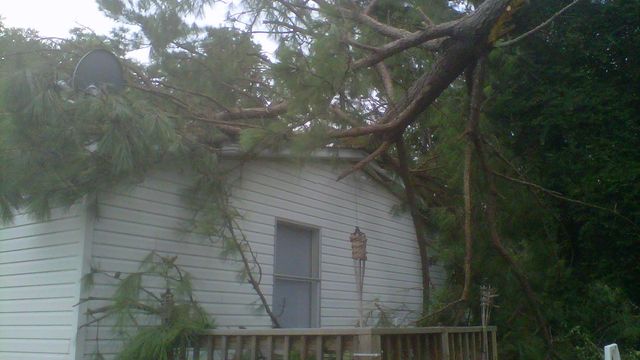Triangle heat wave brings storms, power outages
About 15,000 people in Durham and Raleigh lost power when severe thunderstorms popped up south and east of the Triangle Saturday afternoon in the midst of a record-setting heat wave.
Posted — UpdatedAbout 9,000 people in the Capital Boulevard and Trawick Road area of Raleigh were without power as of 6 p.m., according to Progress Energy. The utility restored power a few hours later. Earlier Saturday, approximately 8,000 Duke Energy customers in southwestern Durham lost power for several hours, a company representative said.
A storm system that rolled through Johnston County knocked down trees and power lines, causing about 200 Progress Energy customers to lose power as well.
"That's really been the main theme of all of the thunderstorms that rolled through the area today – strong winds toppling trees and power lines," said WRAL meteorologist Kim Deaner.
Near Smithfield, N.C. Highway 210 was closed for several hours because a fallen tree was blocking the roadway near Galilee Road. Nearby, at 5953 Black Creek Road, straight-line winds snapped a tree in half, causing the top half to fly 30 yards before spearing James Overby's home and landing in a bedroom.
No one was injured.
Overby, who rented the home with his wife and two children, said he worried about trees on the property when he moved in 5 years ago.
"I looked and the big trees back there and always wondered which one is the one that's going to be in my house one day," Overby said.
The house has been deemed unsafe by county inspectors. They weren't home when the storm hit.
"We're probably going to be staying at my mother-in-law's for the next day or so until we figure out where we're going to move and go from there," Overyby said. "That's basically all we can do."
He said he's sad to leave the home because he and his family were lucky to have "such good neighbors."
Strong to severe thunderstorms also moved through Wilson, Harnett, Moore, Halifax, Sampson and Wake counties, producing damaging wind gusts and very heavy rainfall, Deaner said.
Storms died down at dusk, when the day's scorching high temperatures began to cool off.
The high temperature hit 103 degrees at Raleigh Durham International Airport, marking the fourth day in a row that the mercury has hit the century mark, Deaner said. Four days is the longest streak that temperatures have reached 100 degrees or above at the airport.
Four-day streaks were set in August 1983 and June 2008.
A high of 100 degrees is predicted for Sunday, and if that happens, it will make the longest streak of 100-degree days recorded at RDU.
So far, the highs of 100, 102 and 103 degrees from Wednesday through Friday tied daily records, all set in 1952.
If the temperatures aren't enough, humidity will make it feel even hotter. The heat index will likely rise to between 105 and 110 degrees Sunday, with a good chance of scattered showers and potentially severe thunderstorms, Deaner said.
A heat advisory is in effect during the daytime hours, meaning that chances are greater for heat-related illnesses as a result of prolonged exposure or strenuous activity in the heat.
WakeMed in Raleigh said Friday that 31 people have gone to emergency rooms for heat-related illness and injuries in the past week – a significant increase compared to last year.
Most people being treated, health workers said, are healthy adults, especially construction workers, who have been working outside and have been trying to stay hydrated.
Doctors say staying hydrated is key, but many senior citizens are on heart and blood pressure medicines that flush out fluids, and the seniors don't realize they aren't drinking enough.
The heat is also a danger to pets.
Vets urge owners to limit their pets' outdoor activity to cooler parts of the day and build activity slowly. Owners should watch for breathing problems, vomiting, diarrhea, seizure and collapse.
• Credits
Copyright 2024 by Capitol Broadcasting Company. All rights reserved. This material may not be published, broadcast, rewritten or redistributed.






